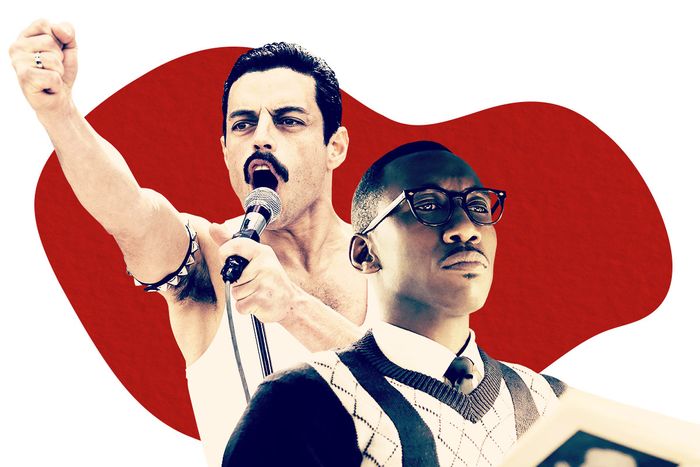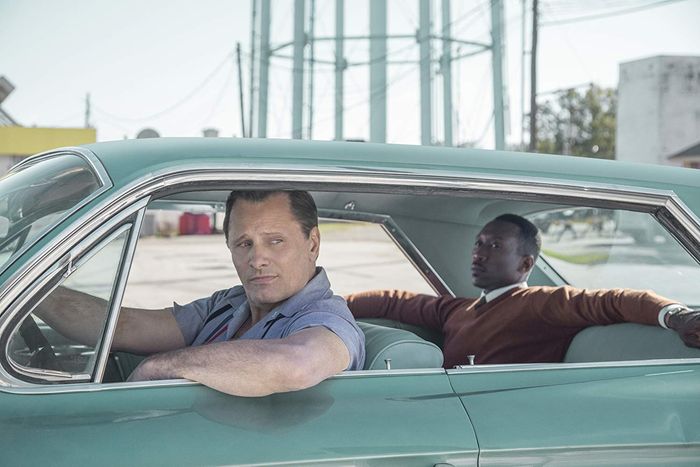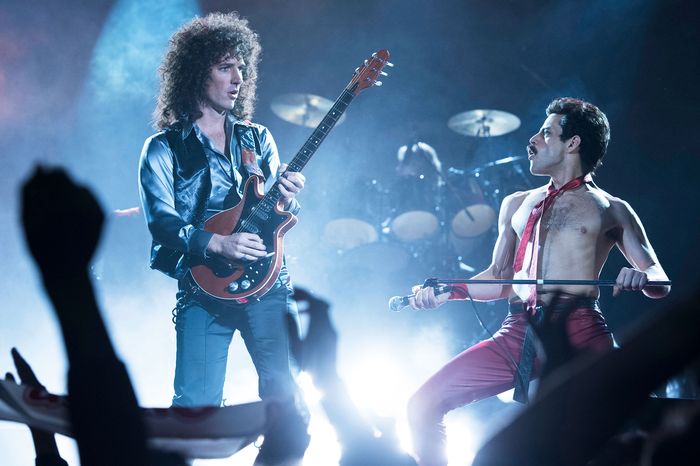
A musical love letter to classic Hollywood, a dark comedy about a woman’s rage, a civil-rights road movie, and a VH1-style rock biopic are not four films that you would immediately lump together — unless you follow the Oscars, in which case you know that La La Land, Three Billboards Outside Ebbing, Missouri, Green Book, and Bohemian Rhapsody all hold the dubious distinction of becoming their respective seasons’ official villains to a certain segment of the awards-watching public.
The Academy Awards have always been the vessel through which to litigate certain debates about film, and past decades’ Oscar villains have usually been those winners that are considered to have stolen the Best Picture prize from a more deserving film. For a certain type of movie buff, this happened in years when the Academy went too intellectual, or too feminine: Annie Hall beating Star Wars, The English Patient beating Fargo, Shakespeare in Love beating Saving Private Ryan. But even in the days before Erykah Badu ever uttered the word woke, the Oscars’ brand of moderate-liberal humanism annoyed fans on the left as well: I suspect certain Academy members still awake in a cold sweat regretting voting for Driving Miss Daisy over Do the Right Thing, or Crash over Brokeback Mountain.
But the tenor of the debate feels like it’s changed in recent years. Part of it is the political polarization of the Trump era, which forces everything from the Super Bowl halftime show to razor commercials to pick a side in the red-blue divide. Part of it is on the Harveys of the world, who turned awards season into a gargantuan six-month campaign complete with professional consultants, “phase I” and “phase II messaging,” and strategic leaks of opposition research. And part of it dates to the #OscarsSoWhite controversy, which raised the stakes of the discussion: If the Academy was going to claim to represent the best of Hollywood, it had better actually represent Hollywood. As Wesley Morris wrote last year, like a midterm election the Oscar race has now become a referendum on the national mood, though the regular moviegoer is even more detached from the Academy’s process than they are from electoral politics. An unworthy Oscar contender spurs up the same type of emotion as a wacko Congressman from another state — what in the world do they see in that?
By now, the life cycle of a late-’10s Oscar villain has been documented over several generations. The movie usually debuts at one of the fall festivals, where it earns rave reviews from the mostly white commentariat. It gets good buzz throughout the fall, and debuts to largely positive reception, but also some side-eyes on social media over its racial or sexual politics. These rumblings are often crystallized in a widely shared piece of criticism, after which viewers are forced to divide themselves into three camps: those who take pride in dunking on the film, those who defend it from the legions of haters, and those in the middle who consider it, at best, a problematic fave. Awards prognosticators write stories about how this negative buzz is not having an impact on voters, a point seemingly proven when the movie performs well at the Golden Globes. The Globes success in turn ramps up the backlash, but the film seems to be skating toward Oscar success until — sometimes at the last possible moment — it loses Best Picture to a less-controversial competitor.
Obviously, we won’t know if Green Book and Bohemian Rhapsody will follow in those same footsteps for a few more weeks. Green Book is generally considered to have stronger odds than Rhapsody: Critics liked it a bit better, and it has the advantage of not having been directed by a man accused of sexual assault. (Weirdly, though Oscar voters seem to love it, Green Book hasn’t actually made that much money — $39 million domestic, which, of this year’s Best Picture crop, ranks above only The Favourite, If Beale Street Could Talk, Vice, and probably Roma. Bohemian Rhapsody, meanwhile, was a genuine worldwide smash.)
Green Book wasn’t pegged as an awards contender before it bowed to a surprisingly enthusiastic reception in the waning days of TIFF, but once it was, it seemed easy to predict that it would end up as the season’s villain. “A comedy about race relations, in which the white guy learns that black people aren’t so different from him, is the kind of thing that used to win Oscars, but is now, in a hopefully more aware era, largely viewed as placating and problematic,” Vanity Fair’s Richard Lawson wrote at the time. From there it looked like you could pretty much write the book: Like La La Land and jazz, and Three Billboards and police brutality, Green Book was telling a story about a black experience, but for white people, by white people. And the argument that its two leads were equals who changed each other didn’t exactly hold water with those inclined to look askance; that just made it both a “white savior” movie and a “magical Negro” movie. (Running Mahershala Ali in Supporting also did not help on this front.) By the time Viggo Mortensen revealed his ignorance of some intricacies of American race relations — namely, when discussing racial slurs, a white person should refrain from actually uttering the words — the film was such a slow pitch down the middle for the think-piece industry that you almost felt bad for it.
Throughout this, the film could fall back on the idea that it was based on a real story, that no matter how aggravatingly evenhanded you found its depiction of the Jim Crow South — this is a movie where two racist cops are offset by exactly two non-racist cops — there was a gem of truth at the center. That defense became less believable when the website Shadow and Act interviewed relatives of the real Don Shirley, who called the movie’s portrayal of the late pianist “a symphony of lies.” The movie’s co-writer Nick Vallelonga, the son of Mortensen’s character, has disputed this, and claims he was following Shirley’s own wishes in his script choices. Shirley died in 2013, so there’s no way of litigating these competing narratives, but the difference between the way the world learned of them is telling: One family’s version of the story became a major studio film, the other family’s didn’t come out until a month after that movie had been released.
The film’s supporters, having seen what happened to La La Land and Three Billboards, have struck a stronger line against the backlash than their predecessors. With First Man floundering, Green Book became Universal’s lead horse in the Oscars race, and Variety and The Hollywood Reporter in particular have given plenty of column inches over to its defense. Team Green Book has been working hard to combat allegations that it’s a film for white people: Producer Octavia Spencer introduced the film at the Globes, and icons like Kareem Abdul-Jabbar, Quincy Jones, and Harry Belafonte have publicly co-signed Vallelonga’s efforts. (That Belafonte also pops up in BlacKkKlansman is a reminder that the battle lines of Oscar season are not always as clearly drawn as they sometimes feel.) Ali has been put in the toughest spot of all, but he’s managed to walk the tightrope, careful to delineate what was his responsibility as an actor from what wasn’t, while never selling out the film entirely. He’s the front-runner for the Supporting Actor Oscar; he deserves it.
Like its heroes, Green Book is following a path mapped out by those who came before. Bohemian Rhapsody is blazing its own Oscar-villain trail. Though it, too, might not have seemed like a strong contender at the beginning of the season, there was no rapturous festival premiere or slowly rolling counter-narrative in its awards journey; early reports suggested the movie would soft-play Freddie Mercury’s sexuality in favor of an inspirational, band-approved version of the story, and that’s exactly what’s happened. But Rhapsody has the added hurdle of conducting its campaign under a title that’s usually only handed out retroactively: the Work of Art by a Man Who Has Been Canceled. When these projects exist in the past tense, the current impulse is to make them disappear as quickly as possible. Reruns of The Cosby Show have been pulled from the airwaves. Lady Gaga and Céline Dion are removing their duets with R. Kelly from streaming services. Louis C.K. was able to make a whole movie about the allegations against him, but once the New York Times got women to go on the record, I Love You, Daddy was no more.
Meanwhile, Bohemian Rhapsody hasn’t just been released, it has thrived. You can chalk up the difference to the strange in-between position that director Bryan Singer currently occupies. Singer was fired from the project in late 2017 during the height of the #MeToo movement, but the official word on the director’s dismissal is that it had nothing to do with the long-standing rumors of sexual assault surrounding him, but rather his clashes with star Rami Malek and frequent unexplained absences from set. (Singer has always denied any criminal behavior, and says he was caring for a sick parent at the time.) In October, an Esquire article seemed poised to do for Singer what the Times had done for C.K., only for the story to fail to materialize. Thus, Singer now has something of a Schrödinger’s career — nothing has been reported conclusively enough to merit a full unpersoning, so he remains both the credited director of a major Oscar contender, and an utterly toxic figure few people will touch. (The good people of Millennium Films being a crucial exception.)
At the Golden Globes, the movie’s team, all of whom were perfectly fine making a movie with Bryan Singer as recently as a year-and-a-half ago, embraced the polite fiction that the movie was directed by no one. (Singer, of course, posted a celebratory Instagram anyway.) The magic trick has been so successful that it’s created a situation in which half the movie’s audience has no idea anything’s amiss, and the other half is outraged that those people don’t know. These three tweets from Eighth Grade star Elsie Fisher are the drama in miniature:
Talking to some Oscar voters over the past few weeks, they’ve felt that kind of whiplash about the two films, too. All they want to do is enjoy a movie about an interracial friendship, or the band they loved as a teenager, and now people are saying that, as good-hearted progressives, they aren’t supposed to like them? It’s not as if Green Book and Bohemian Rhapsody are the works of Richard Wagner; these are big mainstream movies about how being gay is okay, and how lifelong friendships can result if we throw away our biases. If the Oscars are really serious about embracing more popular films, can they really afford to turn their noses up at these two?
As with the president, all this controversy may have the unintended effect of pulling the movies’ fans in closer. Last week, as Oscar voting got underway, Green Book’s season was rocked by two more scandals: On Wednesday, the Cut found an old Newsweek profile in which director Peter Farrelly spoke about flashing his penis to co-workers; on Thursday, Vallelonga was discovered to have tweeted approvingly of a false Islamophobic meme spread by Donald Trump in 2015. The reaction in Hollywood was outrage, on the film’s behalf. They didn’t call it fake news, exactly — no one disputes these things happened — but the discourse around the reveals was quickly taken over by talk of powerful enemies and hidden motives. Was Green Book being targeted by a smear campaign, and if so, who was behind it?
I’ve also heard the complaints, less from voters than from pundits: Can we make any movies about white people these days? Does every Oscar movie have to be Moonlight? While I’m sympathetic to the point of view of the films’ defenders, I think these complaints miss the mark. The Favourite, Can You Ever Forgive Me?, and The Wife all managed to have almost entirely white casts without any controversy. And while Roma and BlacKkKlansman certainly owe a bit of their Best Picture buzz to their contemporary resonance, the category’s current front-runner is A Star Is Born, a film that’s so old-fashioned it’s a remake of a movie from 1937. As long as a movie like Darkest Hour can still get nominated for Best Picture, I think old-school Oscar bait will be fine.
What the two disparate reactions to Green Book and Bohemian Rhapsody are really about is a dispute over the utility of pop-culture comfort food. Everyone agrees that the two movies are beige depictions of the real-life history, that they sanitize their subjects in ways that make them more appealing, but less specific. The question is, amid the trauma of the Trump era, is this kind of comfort a necessary balm, or a harmful distraction? Older Oscar voters have suggested to me that this divide is generational, and while that may be true in a broad sense, I suspect it’s as much a difference of philosophy and outlook as it is demographics. (Think of the way Bernie Sanders and Alexandria Ocasio-Cortez have more in common with each other than either does with Hillary Clinton.) It’s tempting to talk about the Academy as if it’s a singular body with singular tastes, but as my colleague Mark Harris reminds me, it’s actually a fractious group of 6,000 people who disagree with each other as much as you would expect a group of thousands of people who work in the same general industry to. As the past two years have proved, there are plenty who are excited for an infusion of new and diverse perspectives, and as the annual anonymous Oscar ballots prove, there are plenty who … aren’t. We’ll find out which worldview prevailed this season on February 24.







